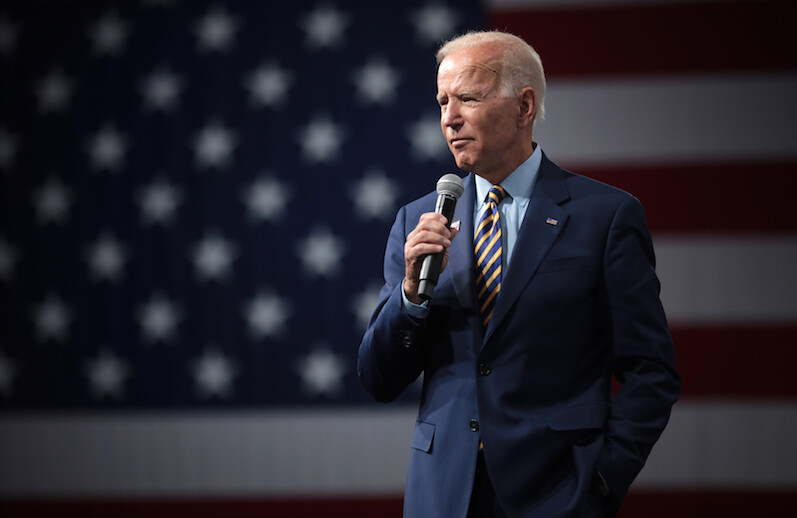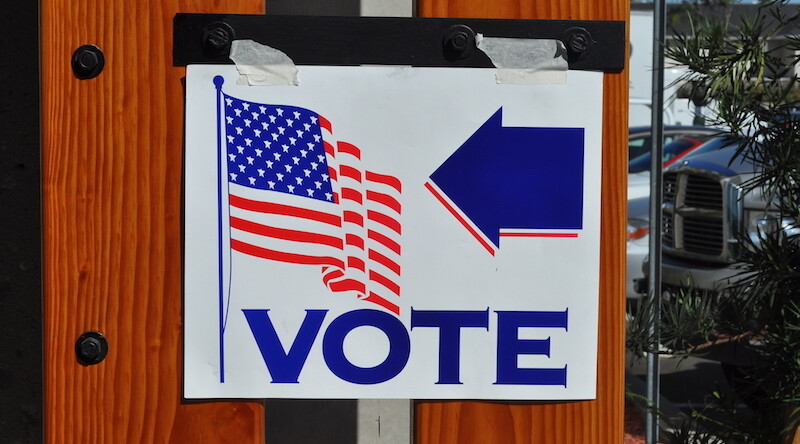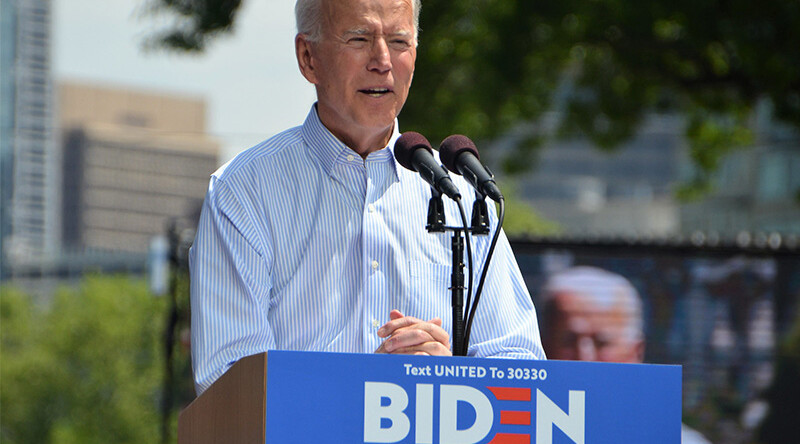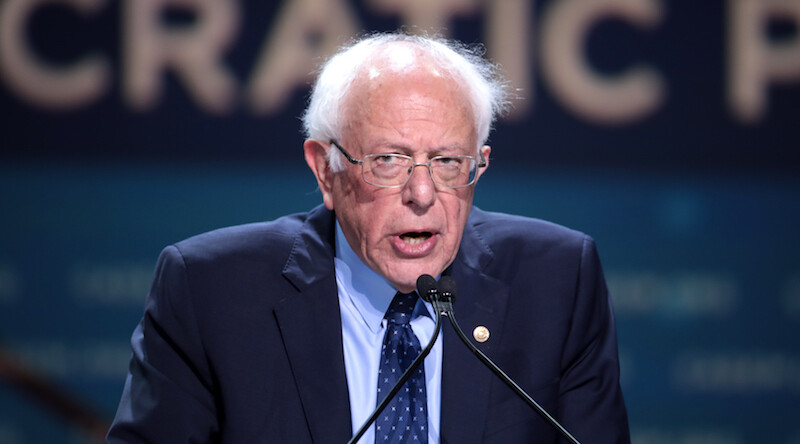Senior Fellow Nikolas Gvosdev looks at the foreign policy discussions after Super Tuesday, with only Joe Biden and Bernie Sanders left with realistic chances at the Democratic nomination. When it comes to the U.S. role in the world, what are the big differences between these two candidates? Is Biden's "restorationist" agenda risky? And looking ahead to a post-Trump future, how have relationships changed between the U.S. and its allies?
ALEX WOODSON: Welcome to Global Ethics Weekly. I'm Alex Woodson from Carnegie Council in New York City.
Today I'm speaking with Carnegie Council Senior Fellow Nikolas Gvosdev. He is also director of the U.S. Global Engagement Program and a professor of national security affairs at U.S. Naval War College.
Nick and I spoke about the results of Super Tuesday and some of the foreign policy discusssions going forward during the Democratic primary and the general election.
For more from Nick, including blog posts, more podcasts, and public events, you can go to carnegiecouncil.org.
For now, calling in from Newport, Rhode Island, here's my talk with Nikolas Gvosdev.
Thanks so much, Nick, for getting on the call. I'm looking forward to this talk.
NIKOLAS GVOSDEV: Thank you.
ALEX WOODSON: We're talking the morning after Super Tuesday. It's about 11:00 a.m. on Wednesday morning.
Just to set it up, Vice President Biden won Alabama, Arkansas, Massachusetts, Minnesota, North Carolina, Oklahoma, Tennessee, Texas, and Virginia. Senator Sanders won Vermont, Utah, and Colorado. As of now, I think only the Associated Press is calling California for Sanders, but he seems to have a fairly sizable lead there.
We talked about this a month ago after the Iowa caucuses, but I think it needs another look today because it seems like this race is going to be between Bernie Sanders and Joe Biden: Bloomberg has dropped out; the other moderate candidates have dropped out; Warren doesn't really seem to have a path to victory. [Editor's note: This was recorded before Senator Warren dropped out of the race.] So we could be looking at the March 15 debate in Phoenix being just Sanders versus Biden.
When it comes to foreign policy, what are the sharpest differences between these two? Where could they really clash on March 15 if the debate goes in that direction?
NIKOLAS GVOSDEV: This is a great question because what we're seeing right now, as the Democratic race for the nomination is shaping up, is that Democratic primary voters are being given very clear choices in Bernie Sanders and Joe Biden as to the direction not only for domestic policy but even more importantly for foreign policy. To the extent that we can discuss this as a foreign policy election or at least a foreign policy primary, even if most voters aren't going in with foreign policy at the top of their agendas, the foreign policy questions are really central to the campaigns of both Joe Biden and Bernie Sanders.
What I mean by that is that Joe Biden is running—if I may paraphrase it this way—to be the "third term of the Obama administration," essentially running to pick up where the Obama administration left off in 2016. This is a view in terms of foreign policy where—and his critique of the Trump administration is that the Trump administration has damaged relationships with allies, has damaged the core principles and functioning of the international order, and that the Obama administration certainly had a vision of the United States at the center of a global trading network spanning across both the Pacific and the Atlantic based upon American forward engagement, projection of American power forward to secure these two trading networks to bring more countries into the order. It was a more activist foreign policy and one where the United States would play a leading international role. The argument has been that this benefits Americans, that Americans benefit by playing this role, that the personal prosperity and security of Americans are secured by America playing a very activist role in international affairs.
Biden may say: "Yes, mistakes were made. We weren't attuned to some things. We need to recalibrate." But essentially what he is going to present to the Democratic primary electorate as his argument to become the nominee of the Democratic Party is a return: "I want to return and pick up where the Obama administration left off."
Most people focus on Bernie Sanders in terms of his domestic agenda, in terms of how he views domestic spending and questions of social welfare, but Sanders' positions on global affairs are very much linked to that. Even if his supporters don't necessarily identify or rally to him because of foreign policy considerations, his foreign policy approach cannot be divorced from his domestic agenda.
Essentially this is what we would describe as "retrenchment." He believes that in order to have a domestic revolution, in order to push forward regeneration of the American social contract, it does require a pulling back from international affairs. Not isolationism, but a pulling back, the United States not necessarily pushing outward in global affairs but prepared to turn more inward, prepared to not necessarily be as engaged.
Congressman Ro Khanna, who is one of Sanders' co-chairs and often serves as a surrogate for the Sanders campaign especially when it comes to foreign policy, was at the Munich Security Conference in February and was laying out what some of these things might look like. One of the issues that really got people's attention there was essentially saying, "We won't continue to support the enlargement of the NATO."
Joe Biden is on record saying: "We need to continue. We need to bring Ukraine in. We need to bring Georgia in." He again is trying to couch that as part of American security where we continue to enlarge the alliance. This makes America more secure.
Khanna's comments in Munich were to say: "We're not going to disband NATO, but perhaps enlargement would provoke tensions with Russia over this issue and provoke tensions with our European allies"—some of whom are a bit more skeptical of NATO enlargement—"maybe we should take NATO enlargement off the table." That is a very big difference between the two campaigns, to have one candidate essentially saying, "We are going to continue with the process of enlargement of NATO," and another saying, "We may need to look at a pause." Perhaps less interventionism; certainly I could see differences emerging in approaches, say, to Venezuela: Should the United States continue to be pressuring for regime change in Venezuela or not? Again, Sanders' argument is that we need to pull inward to focus on our own domestic concerns rather than worrying about every problem around the world.
The other thing that's interesting, of course—and Sanders himself in his rally in Vermont after Super Tuesday really drew a clear, bright, shining line between himself and Joe Biden on the question of trade. Joe Biden, he was saying, is the candidate who supported various free trade pacts—NAFTA; the abortive Trans-Pacific Partnership, which of course was a signature initiative of the Obama administration; the abortive Transatlantic Trade and Investment Partnership—and Sanders drew a line, saying, "These are trade pacts that export jobs away from the United States and take away economic potential from the United States."
In some ways Sanders' critique on trade policy echoes that of Donald Trump, so you have the irony here of—and we will see this on the debate stage on March 15—Senator Sanders echoing comments and positions taken by Donald Trump in the 2016 campaign against Hillary Clinton that Sanders will—in his own way; it's not going to be a complete parallel—echo some of the Trumpian critiques of free trade as unfair to the American worker and unfair to the American economy. I'm sure Sanders will also stress the question of labor and environmental standards that are weakened when we have these international trade pacts and essentially say that Joe Biden stands for the status quo or at least the status quo pre-2016 of promoting these free trade pacts no matter what the impact may be on different constituencies inside the American economy.
I think the trade issue will come front and center, and to some extent that is a foreign policy question, so it'll be interesting to see how that plays out and how it resonates with the Democratic primary electorate in the remaining contests.
ALEX WOODSON: Another point that I'm sure Bernie Sanders will bring up on March 15 if the debate goes to foreign policy is that Joe Biden voted for the Iraq War in 2002 and he didn't. I'm sure Trump will bring that up if Biden makes it to the general election as well. That really seems to be a central critique of Biden from Bernie Sanders.
Do you think that resonates with Democratic voters? Does that resonate with general election voters, or is that just too far in the past? Biden has explained it in a few different ways, but does that really have an effect on voters?
NIKOLAS GVOSDEV: I think it does still because Iraq is still seen as the fundamental foreign policy blunder of this era, that we are still living through the consequences of the Iraq War. That is part of the Sanders critique of saying this bipartisan foreign policy consensus about intervening casually overseas and deploying American power without really thinking of the impact of how American power is used overseas on those who actually have to be carrying it out.
This is a parallel with the trade pacts. From a perspective in Washington, trade and interventions appear to just be calculus on the page, and Sanders will say these are real people, real jobs, and real veterans who have been impacted by these decisions. If that's a line that he takes, it will be interesting.
Does it resonate with voters? Certainly. We saw that this was a problem—it wasn't the main reason that Joe Biden didn't gain traction the last time he ran for president in the 2007–2008 primary season, but certainly that was of concern. There are a number of anti-war constituencies within the Democratic Party and anti-interventionist constituencies for whom Biden's vote is still relevant. The question is, is it relevant enough that should he become the nominee would they not support him in the general election against Donald Trump? I'm not quite sure yet how that would play out.
Again, Sanders shares with Trump this certain degree of iconoclasm about the verities of the use of American power, the way that Trump gained such traction in 2016 for critiquing the Iraq War and then of course now at least Trump trying to put the United States on a glide path toward final disengagement from Afghanistan. I can see where Bernie Sanders may have issues. He may raise concerns, certainly the human rights concern, certainly the question of what happens to women's rights in Afghanistan if you have a peace deal with the Taliban and the Taliban starts exercising governance over different parts of Afghanistan. But on the other hand, I think that Bernie Sanders would be in broad agreement that disengagement from Afghanistan makes sense.
For Joe Biden what will be interesting is the extent to which this disengagement but retaining some residual capacity for dealing with terrorist organizations if groups again try to gain footholds in Afghanistan—that was the core of the plan that he argued for in the Obama administration. He was overruled by Secretary Gates and Secretary Clinton, and then obviously the president chose to go with something beyond just a light counterterrorism force in Afghanistan.
But there is a risk there because if the Trump administration can pull off a successful disengagement from Afghanistan, that's one tack you can take, but Joe Biden critiquing a withdrawal from Afghanistan may run up against problems because I think there are many within the Democratic Party who are also looking to end the Afghan venture and be able to move on. So it will be interesting if Afghanistan comes up in the context of the remaining debates between Sanders and Biden.
ALEX WOODSON: You have said a few times that "we're not going back to where we were before Trump, no matter what happens in 2020." With this in mind, if he does become the Democratic nominee, do you see Biden's foreign policy as a risk? Is it a risk that he is restorationist, that, as you said, he wants to be Obama's "third term"? Does he need some new ideas to attract new voters or to reassure voters that maybe weren't happy with some of Obama's foreign policy decisions?
NIKOLAS GVOSDEV: That's going to be a challenge because you're going to have to deal with that clear wave of discontent that manifested itself in 2016 in both the Democratic and Republican parties about the way things were being done. It may mean a modification. It may mean to say, "Well, we're going to have show greater benefits for Americans," or at least more concrete benefits that engagement around the world brings. If you want to say, "Well, we're going to be rebuilding alliances," then what is it that we expect allies to be doing more of in order to maintain those relationships? The risk that Biden runs is that if he wins the nomination and then wins the general election—as often happens with foreign policy communities that are largely disconnected from domestic political trends, as you pointed out the restorationist approach, which is, "We're just simply going to try to restore the status quo as it existed in 2016 and just pretend that the Trump years didn't happen," it will miss out on these changes that are occurring.
Because even if Bernie Sanders is defeated for the nomination, and as we're looking at these Super Tuesday results we're not seeing in the states where Biden is prevailing—for example, in Texas, which is projected as you said to go for Joe Biden—it's not by a huge, crushing majority as it was in South Carolina; to some extent the numbers are close, Maine being a good example.
Bernie Sanders has a constituency within the Democratic Party. That constituency has a presence in Congress now. It's not as if you're going to be able to pretend, even among Democrats, that the four years of the Trump administration were just a bad dream and now we simply go back to ignoring them. There are going to be constituencies within the Democratic Party that are critical of American interventionism as it is carried out in the Middle East, that are critical of the American role in Latin America that appears to be heavy-handed. There is going to be criticism of anything that looks like an attempt to just focus on bottom-line dollar issues with China, and to ignore the environmental and human rights questions.
So even if Joe Biden comes in and essentially restores or brings back many of the people who were expecting to be part of a Hillary Clinton administration and saying, "We're just going to pick up from where we left off," he won't necessarily have the same blank check. It will also be about how he interprets that mandate.
There are two assumptions here: Let's assume Joe Biden is nominated, and let's assume he wins. Joe Biden winning in November may not always be an affirmative endorsement of "let's restore the past" as much as it is also a number of voters saying, "We want a certain degree of normalcy in the White House, and we want to see President Trump not returned for a second term, but that doesn't mean that we're completely signing up to a pre-2016 agenda."
How he navigates all of that is going to be interesting. If we have a very raucous and contested Democratic Convention over the summer, some of these issues may come out and how the unity issue is managed. If that therefore means that in the name of unity Joe Biden is prepared to say there are things from the Obama administration's foreign policy toolkit that are off the table now, for example, questions about restarting the Trans-Pacific Partnership, which may be a deal breaker if you're trying to hold together a united Democratic Party. Of course, we can recall that Hillary Clinton, who was an architect of the Trans-Pacific Partnership, essentially appeared to repudiate her own handiwork on the 2016 campaign trail. Again, that points to I think this sense that there is disquiet among the American populace.
With that in mind, both Biden and Sanders are tapping into something, and it has to do both with domestic and foreign policy. Right now the Carnegie Council's U.S. Global Engagement Project is engaged in a broad survey to try to get a finger on the pulse of the American body politic when it comes to foreign policy, and not foreign policy surveys of asking, "Do you think we ought to be in Country X?" or "What do you think of this?" but to try to get a sense of the underlying themes.
One of the things that is quite striking is this sense of insecurity, which I think both Biden and Bernie are tapping into from different directions. Nearly half of the respondents so far think that the world has gotten more dangerous. Biden taps into that by saying: "Look, if the United States pulls back from leadership and we have another four years of Donald Trump and the United States withdraws from constructive positions in world events, then the world becomes a lot more dangerous." You have Bernie Sanders tapping into people worried about the environment, worried about environmental collapse, worried about economic collapse, and worried about what happens to the American Dream. Both candidates in 2020 are tapping into this sense of unease that many Americans seem to have.
It's really interesting that only a third of respondents said that they feel the world has gotten safer. So there is that unease. Almost 80 percent of the respondents so far believe that the United States is going to face a major cataclysm within the next 20 years, environmental, economic—certainly the reaction we're seeing to the Coronavirus taps into this real fear of pandemics, and something like that is playing out.
I think both Sanders and Biden are tapping into this sense that, unless something is done, the United States is at risk. Going back to the beginning of our talk, they are offering very different solutions to addressing how the United States should face that risk: Should the United States be going out and snuffing fires overseas before they get here, or should the United States really be turning inward and focusing on regeneration at home? I think that's really what sums up the gap between Sanders and Biden at this point.
ALEX WOODSON: Talking a little bit more about the survey, we should mention that there are about 450 responses. A lot of them came after Tom Nichols posted it on his Twitter feed, so that gives a good indication of the types of people who are taking the survey. There are definitely a lot of interesting results, but it's obviously not representative of the broader American public.
NIKOLAS GVOSDEV: No, which is why we're going to continue running it and certainly increase the number of responses, but it is an interesting first glimpse at what has been coming in.
ALEX WOODSON: Definitely. What I thought was very interesting was that about 80 percent of respondents said that they think "America must take an active role in leading the international community of nations and should shoulder those responsibilities." That is directly on Joe Biden's website—"uniting democracies of the world"—as one of his main foreign policy goals.
What do our allies feel about that—because that's talking to mostly Americans, I think, who took the survey, and obviously you can understand why Americans would want to lead the international community of nations—but what do our allies think about this four years after Trump? Even if Biden comes in, how would they feel about this country that has just been through these four years of breaking every international norm and seeming like a pretty chaotic partner in a lot of situations?
NIKOLAS GVOSDEV: Certainly there are a lot of residual ties that Biden will be able to build on. There are preferences. Even within the four years so far of the Trump administration, we have not left NATO; we have not left any of our major alliance commitments. A President Biden, if he is elected, could simply pick up and say, "We already have a lot of the infrastructure in place."
What I think you'll find, though, going forward is that countries, particularly allies, will want to work with the United States. Their preference is to work with the United States, but they'll do so now with a certain degree of caution. That is, having seen that the Trump administration showed that the United States could withdraw, could pivot, or could become more chaotic, even if there is restoration under Joe Biden, allies will do so with a grain of salt.
They now have seen that the United States can be unreliable in a way that they hadn't necessarily planned on, and they need to hedge. If Joe Biden were to be elected, I think you'd have a lot of fence-mending and making up, and "let's be friends again," but particularly our European allies will continue to hedge as they have been doing over the last number of years. They'll hedge with Russia; they'll hedge to an extent with China.
The same thing is also true in the Middle East. No one will want to be dependent on the United States and then see what would happen in the next election if the United States were to again swing on the pendulum back toward a retrenchment or back toward disengagement, and you are left holding the bag for that. Even Joe Biden, if he were to be in the White House, is going to find that allies are a little more gun shy now about dealing with the United States, and they will be less willing to abandon completely their hedging behavior.
It's not just the Trump administration because Europeans and others are monitoring what's being said in the debates and among Americans. They get a sense of what Americans themselves are saying, and they are aware that there is now this unease and unsureness about the U.S. role in the world that manifests itself both among Republicans and Democrats, and they're going to take that into account moving forward.
ALEX WOODSON: I often think of something that you mentioned a few months ago in one of our podcasts. I asked you about political influence on foreign policy, and you said, "This makes the United States just like any other nation," which is not something that I expected you to say, but it's just something interesting to think about. The United States was unique in the fact that for a few decades at least it didn't really matter who the president was; we had these foreign policy goals. But that has definitely changed for these four years, and we will have to see what happens after Trump.
NIKOLAS GVOSDEV: We are in a position where having demonstrated that it is possible for outsiders to influence and meddle in our domestic election processes, the door is open, and other countries are realizing that given that there are stark foreign policy differences remaining between Bernie Sanders and Joe Biden, and to some extent between whoever the Democratic nominee is and Donald Trump, that you could end up with different policies means that other countries—as you said before, there was a sense of a certain degree of continuity of U.S. policy.
Now if you believe that there are major shifts that could occur—again, let's pick everyone's favorite foreign interferer of choice, which is Russia. The Russians are faced with looking at the 2020 primary and general election campaigns, and they definitely have preferences. They are aware of what a Joe Biden presidency would be like versus a Bernie Sanders versus a Donald Trump and that there are differences. China is aware. Even allies are aware —friends and partners—that one candidate may be more preferable for their interests and that now that the door has been opened for more foreign influence to be manifested, and to some extent because of the changes in our system—
This is a very interesting point. You referenced Tom Nichols before, and let me reference another one of Tom Nichols' pieces in Politico asking about what are some of the changes we've seen in elections in American society. In a social media world candidates today are driven by and respond to people that they don't know who they are. It used to be that there were clear lines: You were a citizen or you weren't a citizen, you were of age to vote or you were not of age to vote. Today someone can have an online identity and could be a voter, could be a child, or could be someone outside the United States, but using social media tools it's possible for them to insert their opinions, it's possible for them to get candidates to react or take positions on things.
The new technologies have opened up—and people might say, "This is good. It democratizes the process," but it also means that when someone tweets at a campaign or starts a Twitter campaign on a particular issue, those people may be voters or they may be living in another country, and it's harder certainly for a campaign to determine whether or not those people are voters or outside of the United States and what the campaign chooses to do in response. There are many ways now in which groups outside of the United States, both state and non-state actors, can try to play a greater role.
If we think of Biden, Sanders, and Trump as the contenders, they do represent different foreign policies, they represent different ethical positions in foreign policy, they have different perspectives, different risk tolerances, different areas of interest. Countries are looking at that and not saying anymore, "Well, whoever wins the White House will more or less carry out the same thing." A Sanders administration would look very different from a Biden administration, both of which would look different from a Trump administration. So other countries are not necessarily thinking that they're going to remain outside of this or that they have no stake in what happens.
ALEX WOODSON: We finished it off last time with a question about this as well. It will be interesting to see how climate change affects these discussions as well because obviously everyone on the Democratic side agrees that climate change is a huge problem. I think you said last time, they're paying a little bit of lip service to the idea that we really need to mobilize for climate change. Nevertheless, they still understand that this is a big problem, and I think that would be a big part of the agenda for a Sanders or Biden presidency, but it's obviously not for the Trump presidency. So it will be interesting to see how that plays out during the general election, where you have extremely clear differences on either side, and it's clear also the way that other nations feel about climate change and how they're seeing this race.
NIKOLAS GVOSDEV: It will be. And then, from that flowing other things, which is that one could see a Sanders administration being, "Let's really push away from hydrocarbons," but also, "Let's really stop a lot of the fracking and shale development," which the Trump administration believes that type of hydrocarbon development is critical as a way to gain leverage against Russia and against Middle East producers. A Biden administration, as the Obama administration did, would really try to straddle this issue of, "Well, we don't want to overdo fracking, but on the other hand, it lessens Russia's influence if America is an energy exporter."
So I think you would see along a scale very differing approaches. Again, we can see, going back to Russia, that Russia certainly has an interest—this is not to say that there is any coordination with or that the Sanders campaign in any way has any connection to Russia, but you can see that there are clear incentives for the Russians to want to see Bernie Sanders prevail in the nomination. If he's committing to—or at least his surrogates are committing; he may himself not—a pause on NATO enlargement, if they would reverse a lot of the decisions on fracking and federal lands and drilling for oil and gas offshore, these are things that benefit Russia.
Sanders would say these are things that would benefit the American environment and that would be his motivating factor, but certainly you can see where the Russians may feel that those policies would be very good for Russia and that now that Russia has these tools for intervening and to be able to nudge—as we said before, you see some activists on Twitter: Is that really an American activist, or is that someone based out of St. Petersburg, who is aping and imitating an activist but then can potentially drive coverage or drive statements made by the campaign, and so on?
Again, this foreign dimension—our election is not taking place in a hermetically sealed environment, but these influences from outside of the United States—allies, opponents, statements by leaders, social media activity, all of that is coming into a permeable election process.
ALEX WOODSON: Thank you so much, Nick.
NIKOLAS GVOSDEV: Thank you.







